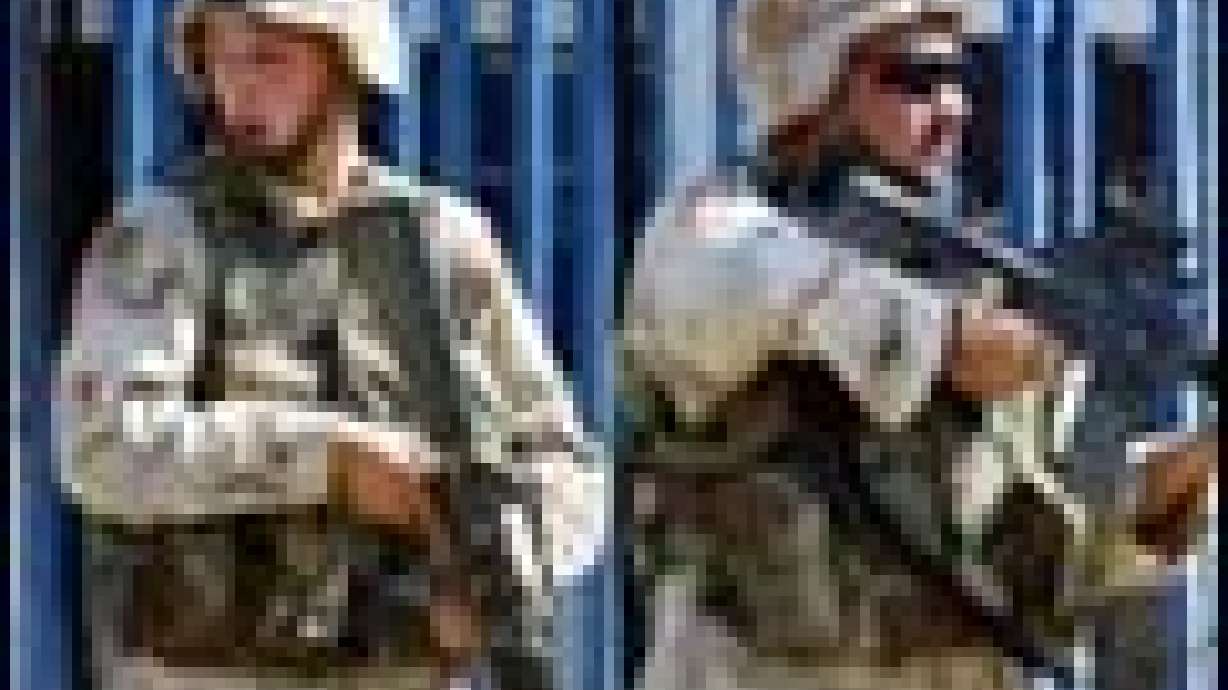Estimated read time: 4-5 minutes
This archived news story is available only for your personal, non-commercial use. Information in the story may be outdated or superseded by additional information. Reading or replaying the story in its archived form does not constitute a republication of the story.
BAGHDAD, Iraq (AP) -- Guerrillas injured six people in an attack Thursday on a police station in central Iraq, and a U.S. armored vehicle was destroyed in an ambush at an intersection in Baghdad. The American troops in the vehicle escaped unhurt.
Meanwhile, a London-based Arabic newspaper quoted Iraq's former planning minister as saying that Saddam might still have stashed away in foreign banks tens of billions of dollars that he skimmed for years from oil revenues.
Jewad Hashem, Iraq's planning minister in the late 1960s and early '70s who now lives in Canada, said that 5 percent of oil revenues was ordered deposited abroad in accounts under Saddam's supervision when Iraq nationalized its oil industry in 1972.
Two rockets struck the Ramadi Police Directorate, 100 miles west of Baghdad, as officers gathered inside to receive their monthly salaries, said Maj. Samir Habib. Two policemen and four civilians were wounded, he said.
Ramadi, a town on the main highway between Iraq and Jordan, is part of the so-called Sunni Triangle -- a region north and west of Baghdad that has seen fierce resistance to the U.S.-led occupation.
In south-central Baghdad, insurgents detonated a roadside bomb near an American military vehicle, witnesses said. Smoke billowed from the tracked, armored vehicle while helicopters clattered overhead and U.S. soldiers cordoned off the area.
"Everybody got out in time," said Sgt. James Thompson, a soldier at the scene.
In Tikrit, a U.S. raid netted several illegal weapons. Such counterinsurgency operations have come under increasing criticism recently, with many analysts warning that the U.S. military was risking alienating significant segments of Iraqis through heavy-handed military responses to hit-and-run attacks by the insurgents.
Hashem's assertion is in his autobiography, which is being excerpted in the Asharq Al-Awsat pan-Arab daily. In Wednesday's except, he wrote that Iraq's former Revolutionary Command Council issued the decree to create a sort of war chest for Saddam's Baath Party.
There was no way to independently confirm Hashem's story. International efforts are under way to track accounts around the world in the name of Saddam, the Baath Party and other former Iraqi officials.
The former minister said Saddam did not want to repeat the mistake of 1963 when a military coup toppled the first Baath government after nine months and it could not return to power quickly because it lacked money.
Hashem said that by his calculation the 5 percent revenues from 1972 until 1990 would amount to $31 billion. After 1990, United Nations sanctions following Iraq's invasion of Kuwait blocked the free transfer of money abroad.
On Wednesday, officials said they were considering creating a specialized Iraqi paramilitary battalion to help fight the insurgents. The plan appears to be aimed at bolstering counterinsurgency efforts and replacing U.S. combat troops in the anti-guerrilla role with Iraqi forces.
The tactical unit would be capable of conducting independent operations.
American officials in Baghdad and Washington said Wednesday that the new 1,000-member unit would be formed by uniting fighters from five Iraqi political parties under the joint leadership of the U.S. military and the emerging Iraqi Civil Defense Corps.
If created, the paramilitary unit would represent a significant policy reversal by the United States, which previously declared private militias illegal and called on Iraqi political leaders to disband them.
The Pentagon's policy chief said Wednesday the United States would welcome militia members into the Iraqi security forces as long as they agreed to drop their previous party affiliations.
"We are willing to take people into these forces as long as when they come in they are not operating as members of these other (militia) forces," U.S. Undersecretary of Defense for Policy Douglas Feith said in Washington.
The militia members would be recruited as individuals, not as intact units, Feith said.
Also Wednesday, U.S. soldiers captured former Brig. Gen. Daham al-Mahemdi, who is suspected of recent contacts with Saddam, in Fallujah, 30 miles west of Baghdad, the military said.
Al-Mahemdi is suspected of keeping in indirect contact with Saddam, while directing guerrilla attacks on U.S. soldiers.
In another raid in Baghdad, Iraqi police and U.S. troops seized a close aide to radical Shiite Muslim cleric Muqtada al-Sadr, who opposes the U.S. occupation. They said Amar Yassiri was arrested on suspicion of involvement in an Oct. 12 ambush on U.S. troops in which two soldiers died.
But on Thursday, a spokesman for al-Sadr denied that Yassiri was in any way connected to the cleric.
"Amar Yassiri does not represent us in any way now," said Sheik Fouad Hassan. "We would like to confirm that we have nothing to do with the killing of the two soldiers."
Hassan said Yassiri had been the head of a security committee formed in Sadr City -- a mainly Shiite district in eastern Baghdad -- in the chaotic aftermath of the fall of Saddam's regime. Yassiri's role ended when the Iraqi police were reconstituted, Hassan said.
In Brussels, U.S. Secretary of State Colin Powell urged NATO on Thursday to consider playing a wider role in Iraq, adding to a reviving debate on possible direct military involvement by the Atlantic alliance.
Although the alliance's involvement is limited to offering logistical support to the Polish-led division in southern Iraq, 18 of the 26 current and soon-to-be NATO members have individually sent troops to the country.
(Copyright 2003 by The Associated Press. All Rights Reserved.)









